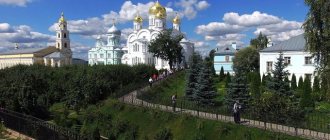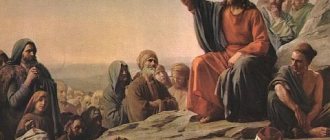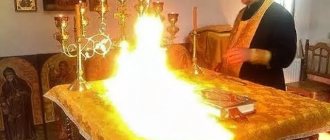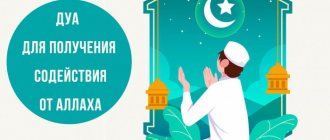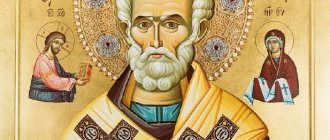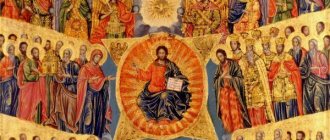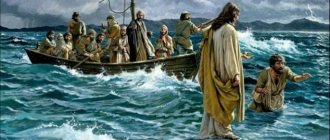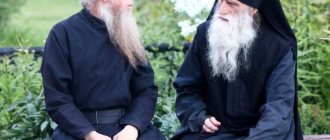Dear reader friends!
Last summer we already introduced you to the book of the now forgotten writer A.A. Dobrovolsky (pseudonym in the Soviet literary space - A. Trishatov) “Ten Mines.” The chapter “The Kremlin” was published on our website - the author’s childhood memory of the miraculous help to him and his little brother from the holy venerable princess Euphrosyne, wife of the patron of our church, the holy noble Grand Duke Demetrius Donskoy.
Today we bring to your attention a fragment of another chapter from this book. And its theme is also holy help, only in the days of the narrator’s youth, when, being in difficult life circumstances, he clearly and visibly felt in his life the protection of the Mother of God Herself, having met one of Her miraculous icons.
Stories like this are always read with particular interest - after all, for many of us they evoke vivid memories of what happened in our own destinies. We carefully keep them in memory, share them with loved ones; these stories are sometimes passed down in families from generation to generation, but, unfortunately, quite rarely become the property of a wide circle of people... But in them the history of a person’s personal relationship with God and His saints is amazingly connected not only with the history of a particular parish, but also with the history of the Church of Christ itself, and also, often, with the history of the country and people... Gathered together, these small, sometimes very simple, heartfelt stories, imbued with faith and love, about the miracle of God’s guidance of human destiny become a real chronicle - soulful, instructive, encouraging and comforting reading, a subject for thought, and sometimes a long-awaited answer to our questions.
Therefore, dear brothers and sisters, we propose to begin collecting and accumulating this valuable experience of communication with God through our common efforts. We already have a certain supply of such memories and promise to gradually introduce them to the readers of our site. And those of you who decide to share your own stories, please send them by email (in case of publication, the name of the author, at his request, can be indicated or replaced with a conventional one).
A.A. Dobrovolsky. “Ten minutes” (fragment).<~h3>
I.
October '17 arrived. After the October Revolution, everyone's life changed. General confusion, uncertainty about the future, loss of property and all material assets, devastation, hunger, disease - all this followed one after another. All my plans collapsed. Along with all the others, those newspapers and magazines with which I was associated were closed. All printing houses were nationalized, including Ryabushinsky’s printing house, where my second book of stories was typed. My acquaintances immediately thinned out. The writers were leaving. Many left for the not yet devastated south, others completely emigrated from Russia.
In our family, only Varya worked, and there were four of us. I, who had always been sick, was now sick all the time. How to live, what to do, how to alleviate Varya’s desperate situation, I completely ceased to understand, did not see any way out and suffered terribly. My friend Vanya tried his best to support me and come up with something for me. And so he began to develop such a plan in front of me. Through the Galitskys, arrange me in some sanatorium in Sokolniki. Let me live there for several months, and during this time something will become clear. Dear Vanya, he tried his best to help me somehow.
One day, soon after our conversation with him, he came to me on Demidovsky Lane in a car that he got from one of his friend’s party members, and took me to Sokolniki. The Galicians received us with all cordiality. But, after talking with us, Stepan Pavlovich announced that all our plans were impracticable and unrealistic. Sanatoriums and hospitals are closing. There is nothing to eat there, just like everywhere else.
Evgenia Alexandrovna consoled us as best she could. Finally she said decisively: “Let Alexander Alexandrovich live with us for a while. Maybe his difficult state of health will dissipate among us. We'll feed him a little. We still have everything, thank God.” She was so kind, so affectionate, so maternally caring that we all decided that it would be good, and I stayed with the Galitskys. (...)
The Galitskys’ apartment was large, with large, bright windows, and hospital-like whitewashed walls. It was, as Vanya said, a truly bright house. And I walked around this “bright house” as if it were my own. One day I walked into Evgenia Alexandrovna’s office. My attention was drawn to one large icon, hung not as usual in the corner of the room, but on the wall, high above the table. The Mother of God was also depicted in an unusual way. Not with a Baby in her arms, but with a book. When I was looking at the icon, Evgenia Alexandrovna entered the room. She said: “I see how you carefully look at the image of the Mother of God. This is an icon of the Kaluga Mother of God, the patroness of my hometown. You will pray to Her, ask Her for your needs. You will see, She will hear you and lead you out of your difficult circumstances, and arrange your life. What I’m telling you is accurate, it’s been tested.”
And she left, closing the door behind her. Her words were spoken with such faith and conviction that I did as she advised me. I knelt before the icon of the Queen of Heaven and with all my zeal and tears I prayed to Her: “Mother of God, You see how difficult it is for me now. Where should I look for a way out? How should I arrange my life? Help me, All-Merciful!”
The next day I returned home. Mom was very happy with me: “Sasha, it’s so good that you came. And Vasya Filippov came yesterday without you and was very upset that he didn’t find you. But he wanted to come in again.”
Vasya was my friend at the gymnasium. We spent all our high school years in close friendship. In the summer I usually went with him to Ostankino, where the Filippovs had their own dachas. In this family I was completely like one of my own. I haven’t seen Vasya since ’14, when he was drafted into the army and went to war. He was wounded, was ill for a long time and lay in different hospitals. And then I lived not in Moscow, but in Petrograd. I knew nothing about him, and his appearance made me very happy. Coming to me that same day and finding me, he immediately said: “Sanka, let’s go with me to Kaluga.” He served in Kaluga as a traveling agronomist at the Kaluga Provincial Union of Cooperation. “You will live with Oleinichak, and I will bring you food from my trips.”
I perceived his invitation to go to Kaluga as a quick response from the Mother of God to my prayer addressed to Her in front of Her Kaluga icon. I saw that the Mother of God was taking me to her city, that She would settle me there.
Two days later, Vasya and I left for Kaluga.
Observer effect
These stories show us how many people have a very good heart, but they are not willing to take the initiative. It’s easier for them to wait for someone else to help. The result is complete inaction, which often ends in tragedy. But there are other people who immediately “get involved” in the situation. They do not wait for the reaction of others and urgently begin to save those who need help.
The world's first 3D printed school may appear in Madagascar
Moscow authorities will carry out landscaping of Krasnaya Presnya Street in 2022
It’s not only fraught with heartburn: why you shouldn’t eat mustard often
II.
We arrived in Kaluga on the feast of the Nativity of the Virgin Mary. When we entered the station, the first thing I saw: in the corner of the passage room there was a huge icon of the Kaluga Mother of God, covering the entire corner of the wall. In front of the icon, many candles were burning in massive candlesticks, blazing like a fire bush. I involuntarily stopped and bowed to the Queen of Heaven who called me here. Somewhat confused, I asked the monk standing next to the icon: “Is this a miraculous icon?” He smiled, but answered calmly: “The miraculous icon of the Kaluga Mother of God is located in the village of Kaluzhka, four miles from the city. And if you came to worship Her, She is now visiting us in the city cathedral.”
Leaving the station, I said to Vasya, who was hiring a cab driver into the city: “Vasya, you take me to the cathedral, I want to pray, and then I’ll find the way to Oleinichaki alone after mass.”
During my student years, I once had to spend the Christmas holidays in Kaluga with the same Vasya, who was serving his exile from Moscow here with his sister. On that visit, I also recognized the Olejniczak family. Vasya and Dunya were then very far from religion and the Church, and while I was with them in Kaluga, I lived a rather distracted life that we shared. Trips, guests, balls in the Assembly of Nobility. I had never been to the cathedral then and I don’t remember whether I saw it.
Approaching the cathedral now, I was struck by its extraordinary beauty. It was a golden autumn. Wonderful day. The holiday, as I already said, is the Nativity of the Virgin Mary. The white buildings surrounding the cathedral, all of the same general style, created some kind of surprisingly harmonious architectural ensemble. The cathedral stood, unobstructed by anything, in the center of this white quadrangle, in a through green park. The sparse, transparent alleys did not cover, but even more highlighted the whiteness of the cathedral and decorated it. The shadows of trembling leaves enlivened its austere walls with a gentle trembling. The round and wide drum was covered to the very edges with a silver dome. It, like an inverted silver bowl, overshadowed the entire building, soothing the eye with its gentle shine and the purity of its impeccable slope.
I entered the cathedral and through all the people I saw the bishop in front of the open Royal Doors on the pulpit with high steps. He was all golden in his vestments, thin and transparent, so similar to the great elder Metropolitan Philaret of Moscow, whose portrait in paint and gold always hung in my grandmother’s room. The bishop held the dikiri and trikiri high. His voice, old, but audible everywhere, exclaimed:
- Look down from heaven, O God, and see and visit these grapes, and establish them, and Thy right hand plant them.
He blessed the people, and three boys in golden surplices who came out to the center in front of the Royal Doors sang in amazingly well-chosen and clear voices: “Holy God...”
So this is where the Queen of Heaven led me.
After the service, I was finally able to approach the holy and miraculous icon. And with all zeal and with tears he prayed: “Mother of God, I come running to You, do not turn Your face away from me, a sinner who is lost and does not know how to live. As You know, settle me in Your city, finding myself here alone without all my loved ones. Save me from want, from hunger, illness and sadness.”
And the Mother of God heeded my prayer. I lived for ten months in Her city and knew neither need nor grief. Whatever difficulty arose in front of me, I went to her and said everything that frightened me, and She mercifully showed me what to do. She never disgraced my hope, She never left my hope in vain.
For two weeks I lived as a guest in the Olejniczak family and three sisters (...). Still, Vasya and I understood that we couldn’t always live like this. Vasya promised to place me in his Gubsoyuz, and everything seemed to be going well. He had excellent relations with all the authorities, and the authorities, of course, would not interfere with my admission. I was happy.
But here another obstacle arose. Unexpected. According to the rules of that time, it was possible to get a job only through the Labor Exchange. At the Labor Exchange, I immediately realized that my case was hopeless. I was bombarded with questions: where did I serve, profession, length of service. And when they found out that I was a newcomer, they stopped talking to me. “If the Gubsoyuz needs a worker, we will send there the one who is in our queue.”
What to do? Vasya thought about it. And I went to the cathedral. And again I fervently prayed: “Mother of God, teach, show me what to do, how to get around the unexpected obstacle that is interfering with my structure.” I decided to stay after the service and defend the prayer service. I wrote a note about the health of loved ones for the prayer service and put it in my pocket.
Before the prayer service, I went up to the lectern to put my note, and all the time I looked at the image again and asked the Mother of God for help. When I took the note out of my pocket, I took out some folded paper with it, which fell on the floor near the steps of the icon case. I picked it up, looked and remembered. When I was leaving Moscow for Kaluga, my friend, the writer Yutanov, came to see me off at the station. When he said goodbye to me, he said: “But I took this note for you from Okulov. You never know what you will need in a foreign city.”
The note contained only a few lines. Addressing his Kaluga comrades, Okulov wrote that he knew me and asked for assistance. Okulov was then a figure in the party, and the note bore a very serious seal. I put the note in my pocket at the station, not knowing why I needed it, and I forgot about it a long time ago. Now throughout the prayer service I stood and thought about her.
“But it’s the Mother of God who tells you what to do.” With the firm conviction that this was so, the next day I went to the stock exchange and asked to be let in to see the manager. I briefly told him that I wanted to join the Provincial Union of Cooperation, and submitted a note. He immediately filled out my directions in a few minutes, and I triumphantly brought them to Vasya. So I entered the service as secretary of the board of the Kaluga Gubsoyuz.
Everything seemed to go well, but a month later a new complication occurred. I lived with Oleinichak in a small room. It was an extension made by Oleinichak’s older brother Anatoly for himself according to his own taste. Completely isolated, with a separate entrance, both the door and the window looked out onto a large apple orchard. Anatoly lived in Moscow. Without him, no one needed his room, and I felt very good in it.
And then one day my elder sister Margarita turned to me.
Everything in this house was wonderful, unlike anything else. All the sisters laughed continuously, and their house was known as “a house of laughter.” For some reason, in this “house of laughter” they called me “August.” So, one evening, when I came home from work, Margarita, choking with laughter, announced to me:
“August, I must report to you, our Anatole sent a letter, writing that he will arrive soon and will live in Kaluga for the winter. “He comes with him,” here she completely choked with laughter, “and his Terpsichore.”
I realized that I needed to vacate the room. The next day in the Union I told Vasya everything. He tried to calm me down and energetically set about finding a room for me. And again the difficulties of initial communism arose before us. It turned out that all the vacated rooms are handed over to the city council and are occupied, again in order of priority.
Finally, Vasya was pointed to a lady where the tenant was planning to leave either for Asia or the Caucasus. The lady agreed to accommodate me if I got a warrant for the room. I got the warrant. I announced to my laughing sisters that I was moving, and suddenly this lady told Vasya that the tenant had changed his mind about leaving and was staying until spring. What a desperate situation I found myself in! Now I went to the cathedral constantly, every Sunday without fail. And now, having arrived at the cathedral, I went straight, without waiting for the end of the service. I fell down on the steps in front of the image of the Mother of God and told Her about my circumstances, about my grief and hopeless situation. I climbed the steps and, still praying and asking for help, venerated the icon. When I began to walk down the steps and had not even reached the floor, a lady approached me with the question: “Are you the person who wants to rent a room from me? If this is you, then you can move now after mass. My tenant left today.”
I have already said that I always went to the cathedral. My new room was very close to the cathedral, and I went there in all weathers, rain and snow. The Kaluga cathedrals served wonderfully. The bishop's services in the cathedral were wonderful. Such decorum, harmony, and exemplary order could not be found everywhere. And what splendor and beauty of the vestments! All these lalas and pearls on mitres, diamond panagias.
Bishop Feofan (Tulyakov), apparently, loved Divine services very much, understood and felt it subtly. The choir in the church was wonderful. Among the women's voices there was one absolutely amazing. It was a teenage girl, Lida Rumyantseva, with a voice of such beauty that people came to listen to her as if they were going to some concert.
I lived in Kaluga for ten and a half months. I attended church services every week. I have almost gone through the full annual circle of Divine services, starting from the Nativity of the Virgin Mary and ending with the Dormition Fast.
For me this was a real school. Here, in the church, through the Divine service itself, through icons and church singing, I learned and became familiar with the truths and sacraments of Christianity. The rest was completed by home prayer and zeal for the Mother of God. My religious mood was, of course, noticed at my service. But the women, typists and secretaries with whom I was in constant communication - all these Kashkins, Nazimovs, Larins, Durasovs - were all representatives of old noble families, whom the revolution that took place in Russia drove in search of a piece of bread to our sad work. All these women were religious themselves, and my behavior did not bother them much. It may have not only embarrassed, but surprised one of our typists, Maria or Marusya Preobrazhenskaya. The daughter of a very venerable and respected archpriest in Kaluga, she, as often happened in pre-revolutionary times, coming from a spiritual family, was herself far from religion. She was especially struck by my zeal for the Mother of God. She once told me: “You are kind of weird. For you, the Kaluga Mother of God is like your own mother.” I was silent. I didn’t want to let anyone into my inner world.
As time went. Lent, Easter, and Trinity have passed. Mom began to write to me that she really wanted me to come back, that they all missed me very much, that my arrival was necessary, otherwise they would take away one of our rooms. There was another reason that made me think about returning. The Whites were advancing in the south. It was becoming dangerous to stay in Kaluga. But when I came to the cathedral, I was saddened to tears to leave this church world that had become so dear and necessary to me. I saw the miraculous icon only when I arrived in Kaluga. Usually she was in the village of Kaluzhka, and I reproached myself very much for not going there all summer and not seeing Her again. I prayed earnestly in front of the cathedral list from her, I asked the Mother of God: “Do not leave me in the future. Teach me, show me from whom to seek guidance, so that my beginning spiritual life does not weaken and fade away.”
But now the day of departure has been set. I was traveling to Moscow with a whole group of our cooperators. I found that it would be more convenient for me. Traveling by rail at that time was not easy, and I hoped that my cooperators would help me. And the Union provided horses to the station.
On the eve of departure, I went for a walk around Kaluga, saying goodbye to my favorite places. I remember I walked through the grove from the Oka to the city. It was getting dark. Suddenly the bell began to ring. One after another, all the Kaluga churches pestered him. I asked the women I met: “Why do they call like that?”
“Yes, they are bringing the Lady to the cathedral,” they answered me, “she came to us, bitter ones, from Kaluga.”
I rushed into the cathedral. Lord, how I prayed this evening! How I cried and thanked the Queen of Heaven that She came to see me off and bless me!
III.
The next day I was leaving. I came to the Gubsoyuz with my things. I didn't have much stuff. Some kind of awkward bundle, a basket... I had nothing to take home. This was not the case with my companions. They loaded bags and boxes. They brought all kinds of food. We were already sitting in the cab with one of our purchasing specialists. At this time, Marusya Preobrazhenskaya came running to us. She said goodbye to my neighbor, and then turned to me a little embarrassedly: “Alexander Alexandrovich, take this from me. You loved the Kaluga Mother of God so much.
I took Her off the shrine for you. Remember me, sinful Mary." She handed me an icon wrapped in paper. I was ready to cry, it shocked me so much. I took the holy icon in my hands. We've already left. And so I rode, holding the icon in my hands. I held it in my hands on the train too. It seemed blasphemous to me to put it in a basket or put it on a shelf. And the cooperators, perhaps good-naturedly, laughed at me: some were bringing butter to Moscow, some flour, some lard, and Comrade Dobrovolsky - the Kaluga Mother of God.
When I got home and took off the paper, I was very interested. Marusya, of course, without understanding, wrapped the Most Pure Face with pages from the calendar of the cross. Large format, they covered the icon well. But what was remarkable: on the pages that covered the icon, portraits and an article were printed - biographical information and a presentation of the teachings of one of our Russian ascetics - St. Ignatius Brianchaninov, about whom I knew nothing before.
The Mother of God did not leave my last request. In Her icon She remained with me and pointed me to St. Ignatius as a mentor in my spiritual struggle.
Let's do good together
My name is Marina, and my husband's name is Dima. Every year we try to take part in various charity programs of the foundation. And although we do not have special skills in this area, we periodically visited orphanages, nursing homes and participated in supporting charity concerts.
Dima cooks very well, this is one of his favorite hobbies in life. Recently, he and I took part in preparing lunches for those in need. I want to share with you what this means to me personally. I don’t have a very merciful heart, sometimes I have to fight partiality, and sometimes I need to gather my will into a fist, especially when it comes to children, I feel very sorry for them. My husband and I are believers and try to adhere to what the Bible says: “But when you give to the poor, do not let your left hand know what your right hand is doing” (Matthew 6:3).
